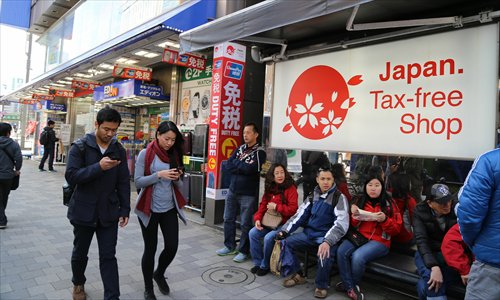HOME >> BUSINESS
Tariff cut set to spur consumption
By Liang Fei Source:Global Times Published: 2015-5-31 23:18:09
Measure also expected to boost imports

Chinese tourists wait outside a duty-free shop specializing in electronic goods in Tokyo's Akihabara shopping district. Photo: CFP
Import tariffs on 14 kinds of consumer goods such as skin-care products and sneakers have been lowered by an average of 50 percent starting from Monday, in a move to spur domestic consumption.
The current tariff on skin-care products has been reduced to 2 percent from the previous 5 percent, and for fur clothing it has been cut to 10 percent from 23 percent, according to the Ministry of Finance (MOF).
"It is necessary to boost domestic consumption," Vice Finance Minister Shi Yaobin said at a press conference on Friday, given that growth in domestic consumption has been slowing down amid the overall cooling in the economy, while overseas spending by Chinese consumers has been rising.
In 2014, the total number of China's outbound tourists surpassed 100 million, with over 1 trillion yuan ($161.3 billion) spent overseas, according to Shi.
Also, the deficit in China's tourist services trade totaled $107.9 billion in 2014, up 40.3 percent year-on-year, according to data from the Ministry of Commerce (MOFCOM) on May 5.
Meanwhile, growth in domestic consumption has been slowing. In the first four months of 2015, the country's total retail sales reached 9.31 trillion yuan, up 10.4 percent on a yearly basis but 1.6 percentage points lower than in the same period of 2014, according to data from the National Bureau of Statistics.
Chinese tourists are often eager to buy goods when traveling abroad, partly because China's import tariffs mean that foreign goods are often far more expensive in the domestic market than they are overseas.
They are also eager to buy specialty items, such as smart toilet seats sold in Japan. During this year's Spring Festival holidays, which fell in February, some Japanese stores sold out of the toilet seats following a shopping rush by Chinese tourists.
Besides the tariff cut, the MOF is also considering opening more duty-free shops and further improving tax-refund policies for overseas tourists visiting China in order to boost domestic consumption, Shi said.
But he noted that such measures are intended to offer convenience for consumers, rather than discouraging spending by Chinese consumers in other countries and regions.
"It is inevitable that tourists will buy some specialty products and souvenirs when they travel abroad, but purchases of daily necessities should be mostly kept in the domestic market," Bai Ming, a research fellow at the Chinese Academy of International Trade and Economic Cooperation, told the Global Times Sunday.
Cosmetics firms have announced a cut in prices of their goods in China after the adjustment in import tariffs, including French cosmetics giant L'Oréal SA and US-based Estée Lauder.
"If the price could be reduced to the same level as that in overseas markets, or even if it's just slightly higher, of course people will make purchases here [in the domestic market], as it is much more convenient," Zhao Nan, a Beijing-based tour guide who often travels abroad, told the Global Times Sunday.
Addressing concerns that the tariff adjustment may weigh on the country's tax revenue, Shi told the press conference that it will not have a big effect, as lower duties are expected to boost imports, and more imports will in turn boost economic growth.
Consumption is playing an increasingly important role in China's economy as exports shrink amid sluggish external demand. In 2014, consumption accounted for 51.2 percent of China's GDP growth, 3 percentage points higher than in 2013, according to MOFCOM.
Besides efforts to boost consumption, the central government has also rolled out measures to stimulate investment and trade recently, with the country's economy having slowed to a six-year low of 7 percent in the first quarter.
"The effects of these measures in supporting economic growth will gradually be seen," Xu Hongcai, director of the Economic Research Department at the China Center for International Economic Exchanges, told the Global Times Sunday.
Posted in: Economy